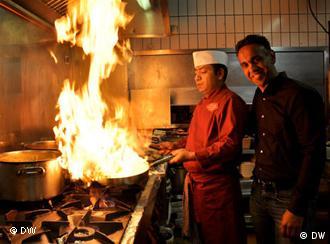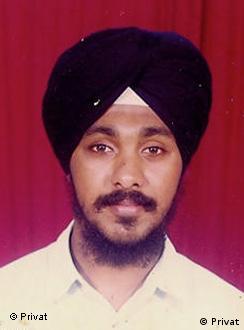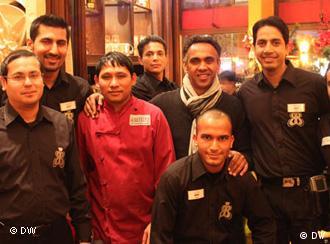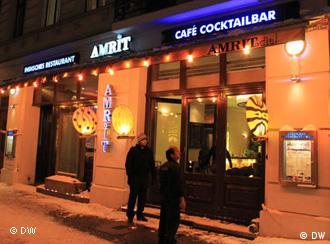The success story of Bunty Bans
His success story is remarkable: Back in 1996, Bunty Bans from India, who has just turned 26, decides to open his first restaurant in Berlin, the “Amrit”, which means “nectar”. Now Bans runs five restaurants in Berlin.

The food in the pots and pans of the “Amrit” restaurant in Berlin is boiling, bubbling and sizzling menacingly. The air is filled with the smell of exotic spices. Bunty Bans glances around the kitchen to reassure himself that his team has the situation there under control. The restaurant -located in the notorious district of Kreuzberg and today one of the best known places for Indian cuisine in Berlin- is as always jam-packed. Bans then slips back behind the bar where with a smile on his lips he attends to the needs of his customers in his usual charming manner. Bans now employs 150 staff. Even Bollywood-Stars like Shahrukh Khan make a point of dining at the “Amrit” when they are in Berlin. Berlin is a city that is somehow very open and laid back, says Bans. It is his kind of city.
Many challenges
But although Bans is now very successful, life in Germany was not always easy. He had to take a lot of tough decisions and find the courage to take on the challenge, he says: „When I came to Germany, my outward appearance reflected who I was. But I got the feeling that people did not accept me because of my appearance.” At that point, Bans had to decide whether I was going to stay here or go back home. I decided to stay, to take off my turban and cut off my long hair.”

Religion still very important
It wasn’t an easy step, Bans recalls wistfully. But despite the change in his appearance, his religion is to him – as a Sikh – very important indeed. He says he finds happiness and comfort when living in accordance with the teachings and the laws of the Sikh religion, which was founded in the 15th century. Bans says that he tries to stave off the so-called five evils: anger, selfishness, greed and jealousy, rage and an emotional attachment to material things. He wants his nine-year old twin sons, who are growing up in Germany and whose friends are mostly German, to be familiar with their roots.
Therefore he makes every effort to maintain a close connection between Germany and India where Bans spent a happy childhood and where his parents still live: „Whenever I am in India, I strive for inner peace and strength. Whenever I visit Amritsar and the Golden Temple of the Sikh religion, I am touched by the power the place holds.” Bunty Bans’ children were born in Germany and are growing up in German society. He says: “ But I am trying to encourage them to develop an emotional attachment to their own culture back in India. That is why I try to make sure that my children visit India in their summer holidays or that they learn something about their roots every year when my parents come to visit me.”
Bunty Bans: A true family man
Bunty Bans lives for his family. He runs his five restaurants with his elder brother Bitu. His relationship with the staff is friendly and respectful. If they come to him with problems he tries to help them like any friend would. Despite his success, Bans dresses modestly, usually just wearing jeans and shirt. His burning ambition ensures that every single thing he does is done perfectly and one hundred percent. He often looks in at the weekends to make sure his restaurants and his office are running smoothly even if that means spending less time with his family.

However, Bans says with a coy grin that he likes his wife’s cooking best. Eating at home is simply different from eating in a restaurant, especially if his wife has cooked “Makki ki roti”, a traditional kind of bread made of Indian corn, lentils known as „Dal“ and his favorite vegetable dish with potatoes called “Aloo Methi”. Asked about the differences in everyday life in India and Germany, he says: „I think that as an Indian it was difficult for me to get used to the bureaucracy in Germany. Many applications take time to get processed and some things are tough.” Of course there is a reason for this, he adds: “Many people try to come to Germany using the wrong methods. But I want to be productive and many bureaucratic processes take too long and are much too complicated. “
The success story of Bunty Bans
Bunty Bans was born in 1970 and grew up near Mumbai. Life there shaped him. The port city and financial capital of India with its 20 million inhabitants has been regarded for years as a cultural melting pot, as a city that sets trends and is bursting with life. There tradition and modernity meet face to face. Just like in Berlin, says Bunty Bans. After studying engineering he wanted to try his luck in Germany. But he had problems getting his Indian degree recognised in Germany. As a result he worked as a waiter in a restaurant in Berlin for a couple of years. Meanwhile his elder brother Bitu, whom Bunty adores, was studying business and hotel management in the USA. Suddenly they got the idea of starting up a restaurant in Berlin just across the road from the restaurant where Bunty had been working as a waiter.
Hard work and passion

The idea was to set up something really special, to showcase Indian cuisine, to make dining a culinary experience at a time when clichés dominated Germans’ perceptions of India. His success as a pioneer in this field surprised even Bunty Bans: „In the final analysis I can only say that the Germans accepted me as I am. But I tried from the very beginning to integrate myself into this society too. As I come from Mumbai I grew up in a multicultural society so it wasn’t too difficult for me to adjust.” Bans has many German friends: “When me and my wife got married eleven years ago, 30 of my German friends travelled to India just for that occasion. I think that says a great deal. “
Bunty Bans recalls that his father sold once his bicycle and used the money to buy a one-way-ticket from his village in the Punjab to Mumbai. Just like him Bunty Bans started from scratch in Berlin. Today no-one can imagine Berlin’s gourmet hotspots without Bans. He has come a long way from Mumbai to Berlin. But as this modest man has demonstrated the journey was in many respects not actually that far.